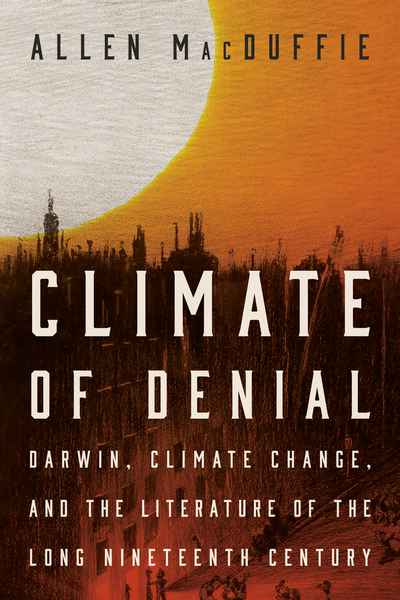
August 2024
296 pages.
from $32.00
Paperback now $16.00 (50% off)
Hardcover ISBN: 9781503638938
Paperback ISBN: 9781503639546
Ebook ISBN: 9781503639553
Many people today experience the climate crisis with a divided state of mind: aware of the extreme effects, but living everyday life as if the crisis is not actually happening. This book argues that this structure of feeling has roots that can be traced back to the nineteenth century, when Western culture encountered the profound shock of Charles Darwin's theory of evolution.
Darwin's theory made it increasingly difficult for secular humanists to flatly deny that humans are animals, fully enmeshed in natural systems and processes. But like those of us confronting climate change today, many writers and scientists struggled to integrate its depersonalizing vision into their understanding of the place of humans in the natural order. The result was that the radical environmental implications of The Origin of Species were evaded as soon as they were articulated, abetted by a culture of denial structured by the illusions of capital and empire.
In light of the climate emergency, Climate of Denial recontextualizes nineteenth-century texts to offer rich insight into the defensive strategies used—then and now—to avoid confronting the unsettling realities of our situation on this planet.
About the author
Allen MacDuffie is Associate Professor of English at the University of Texas at Austin. He is the author of Victorian Literature, Energy, and the Ecological Imagination (2014).
"In this eagerly anticipated book, MacDuffie makes a rich argument that is convincingly and expansively elaborated across the chapters and expressed in supple, erudite prose. Graceful and poignant."
—Elizabeth Carolyn Miller, University of California, Davis
"What a pleasure it was to read this gorgeously written and important book, and to learn from its humane, balanced analysis of the continuities between Darwinian denial and the kinds of dangerous unknowing characterizing the climate emergency today."
—Nathan K. Hensley, Georgetown University
"This brilliant and tonic book challenges and gives pleasure to the reader. It demonstrates the ingenious ways we seek to bypass intolerable truths like loss and extinction and climate change—and how fiction grapples us into seeking those truths."
—Dame Gillian Beer, University of Cambridge